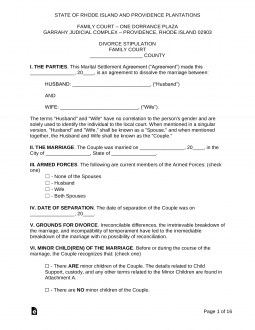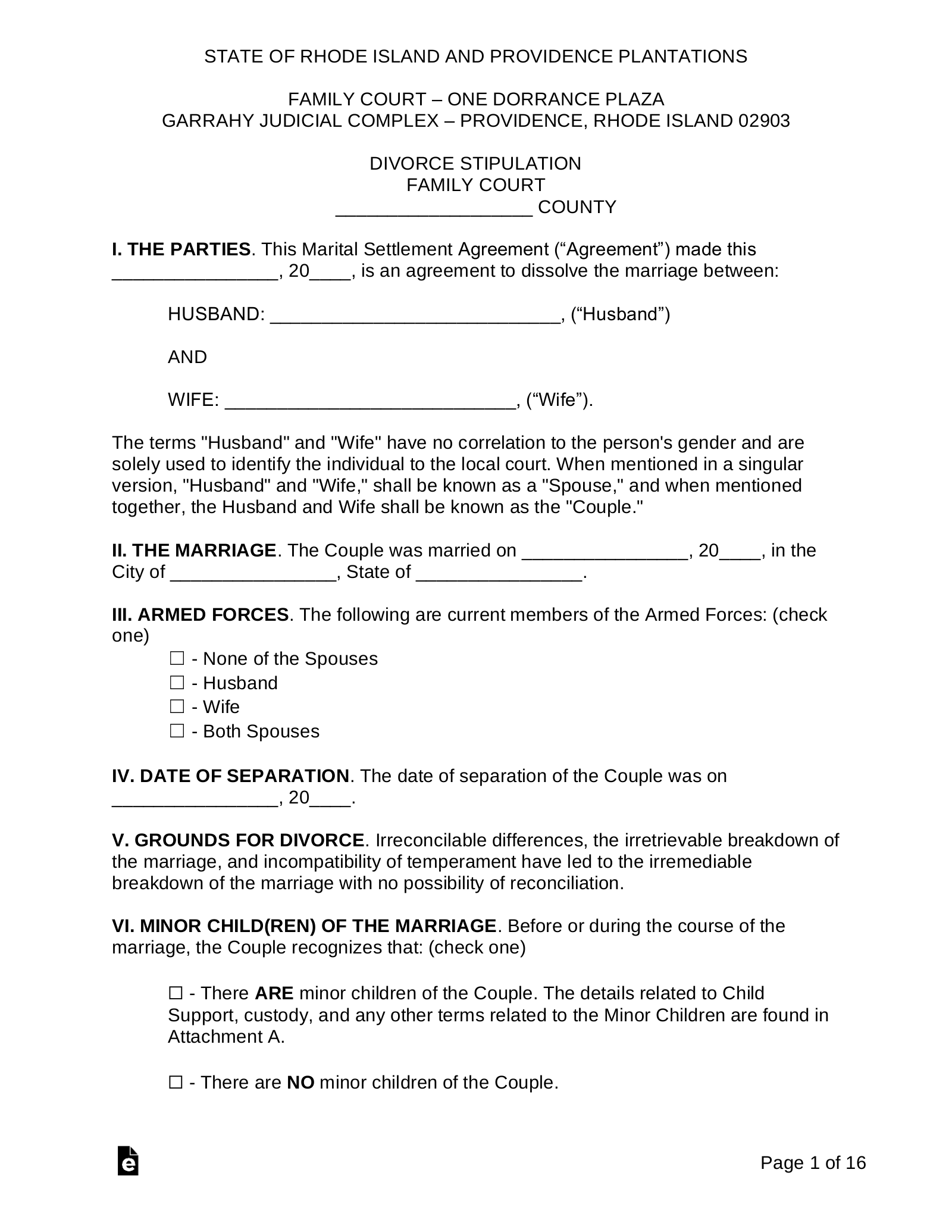Updated August 29, 2023
A Rhode Island marital settlement agreement is a divorce document executed by a married couple for the purposes of arranging the terms of their divorce. A settlement defines the understanding between the parties with regard to the division of their properties and assets, the payment plan for spousal support and child support, and child custody and visitation rights. A marital settlement agreement is a legally binding document and it is recommended that the spouses seek legal counsel or mediation to ensure all matters are covered by the agreement. If the spouses are getting divorced and cannot agree on all matters that are included in a settlement agreement, the courts will have to make all these decisions for them, through a typically long and expensive legal battle. However, spouses can file for an uncontested divorce, and as long as all the important affairs are covered in their settlement agreement, the courts will approve the divorce and the agreement will define how all issues will be settled once the divorce is ordered.
Table of Contents |
Divorce Laws
Statutes – Chapter 15-5 (Divorce and Separation)
Alimony (§ 15-5-16) – In divorce cases, either spouse may be awarded alimony as ordered by the court. The court considers the following factors when establishing a fair schedule and amount of alimony:
- Length of the marriage
- Conduct of the parties during the marriage
- Health, age, station, occupation, amount and source of income, vocational skills, and employability of the parties
- State and the liabilities and needs of each party
- The inability of either spouse to support themselves adequately because they are the primary custodian of a child and these circumstances prevent them from seeking full-time employment
- The inability of either spouse to support themselves adequately due to their absence from the workforce while fulfilling homemaking responsibilities, the extent to which their education, skills, or experience are outmoded and their earning capacity diminished
- The time and expense required to acquire education and training to find appropriate employment
- The probability of completing education or training and becoming self-supporting
- The standard of living during marriage
- The opportunity of either party for future acquisition of capital assets and income
- The supporting spouse’s earning capacity, earned and unearned income, assets, debts, and standard of living
Alimony Calculator – calculators.law
Child Support (§ 15-5-16.2) – Child support is determined by the courts in divorce actions where the parents cannot agree on these matters. The court will use the Child Support Guideline Schedule, as well as their own discretion, to determine equitable child support.
Child Support Calculator – Office of Child Support Services
Division of Property (§ 15-5-16.1) – In an action for divorce, the court may award (assign) certain properties or a portion of the estate to a spouse in addition to or in lieu of alimony. Only community property (property of the marriage) is considered while making such assignments, i.e., the court will not take into account property owned by either spouse before the marriage, nor property inherited by or gifted to either spouse. When dividing the estate, the court will do its best to distribute the properties equitably between the spouses.
Grounds for Divorce (§ 15-5-2 and § 15-5-3.1) – The following is a list of the legitimate grounds for divorce in the state of Rhode Island:
- Impotency
- Adultery
- Extreme cruelty
- Willful desertion (must be for five (5) years, unless the court allows for a shorter desertion period)
- Continued drunkenness
- Habitual, excessive, and intemperate use of opium, morphine, or chloral
- Neglect and refusal on the part of the husband (for at least one (1) year) to provide necessaries for the subsistence of his wife
- Any gross misbehavior and wickedness repugnant to and in violation of the marriage covenant
- Irreconcilable differences causing an irremediable breakdown of the marriage*
*Irreconcilable differences is the only grounds for divorce which is not considered fault-based.
Interim Support – Interim support is not specifically mentioned in state statutes.
Residency (§ 15-5-12(a)) – A divorce action complaint may be filed by either spouse as long as one (1) of the spouses has resided in the state of Rhode Island for a period of one (1) year before the filing of the action.
Separation (§ 15-5-3(a)) – Separation is not a legal requirement of a divorce action; however, spouses filing a divorce complaint due to the parties living separate and apart must have lived separate and apart for at least three (3) years prior to filing the action.
Divorce Forms
Almost all Rhode Island divorce forms must be requested through the family court clerks office.
- Where to File – Family Court
- Filing Fee – Fees vary by county
- How Long Does it Take? Seventy-five (75) days (min.) (source: Kirshenbaum & Kirshenbaum)
Uncontested Divorce with No Children:
- Complaint
- Summons
- Proof of Service
- Marital Settlement Agreement
- Entry of Appearance and Waiver of Service
- Notice of Hearing
- Decision Pending Entry of Final Judgment
- Final Judgment of Divorce
Uncontested Divorce With Children:
- Complaint
- Summons
- Proof of Service
- Marital Settlement Agreement
- Schedule for Visitation for Minor Children
- Child Support Guidelines, Worksheet and Income Table
- Declaration Under the Uniform Child Custody Jurisdiction Act
- Entry of Appearance and Waiver of Service
- Notice of Hearing
- Decision Pending Entry of Final Judgment
- Final Judgment of Divorce
How to File for Divorce in Rhode Island (4 steps)
1. Complaint
 To file for an uncontested divorce in Rhode Island, the spouses must be getting a divorce due to irreconcilable differences that have caused an irremediable breakdown of the marriage, or they have lived separately for at least three (3) years. At least one (1) of the spouses must have been a resident of the state of Rhode Island for at least one (1) year prior to the filing of the divorce action. Furthermore, the parties must completely agree on all matters relating to their divorce, including, but limited to, alimony, property division, child support, child custody. To file for divorce, one of the spouses must file a Complaint form. This spouse becomes the plaintiff and the other spouse becomes the defendant, solely for the purposes of the divorce proceedings. The Complaint must be filed with the family court in the county in which either party lives. The plaintiff will be asked to pay the filing fee (which varies by county) and they will be provided with a Summons form.
To file for an uncontested divorce in Rhode Island, the spouses must be getting a divorce due to irreconcilable differences that have caused an irremediable breakdown of the marriage, or they have lived separately for at least three (3) years. At least one (1) of the spouses must have been a resident of the state of Rhode Island for at least one (1) year prior to the filing of the divorce action. Furthermore, the parties must completely agree on all matters relating to their divorce, including, but limited to, alimony, property division, child support, child custody. To file for divorce, one of the spouses must file a Complaint form. This spouse becomes the plaintiff and the other spouse becomes the defendant, solely for the purposes of the divorce proceedings. The Complaint must be filed with the family court in the county in which either party lives. The plaintiff will be asked to pay the filing fee (which varies by county) and they will be provided with a Summons form.
2. Serve Defendant
3. Hearing
 Even though the divorce action is uncontested, a judge will require a hearing (called a nominal hearing) where both parties, as well as any necessary witnesses, will be asked to testify. Witnesses are only used to corroborate the separation period or irreconcilable differences of the parties, depending on the nature of the action. The judge also wants to make sure the spouses agree to all matters related to their divorce, such as alimony, property division, child support, and child custody. At this point, the parties may provide the judge with a Marital Settlement Agreement. This isn’t a required document, but it is a useful divorce tool in situations where both spouses agree on all divorce issues. The judge will also ask to review the forms involving minor children, the Schedule for Visitation for Minor Children, the Child Support Guidelines, Worksheet and Income Table, and the Declaration Under the Uniform Child Custody Jurisdiction Act.
Even though the divorce action is uncontested, a judge will require a hearing (called a nominal hearing) where both parties, as well as any necessary witnesses, will be asked to testify. Witnesses are only used to corroborate the separation period or irreconcilable differences of the parties, depending on the nature of the action. The judge also wants to make sure the spouses agree to all matters related to their divorce, such as alimony, property division, child support, and child custody. At this point, the parties may provide the judge with a Marital Settlement Agreement. This isn’t a required document, but it is a useful divorce tool in situations where both spouses agree on all divorce issues. The judge will also ask to review the forms involving minor children, the Schedule for Visitation for Minor Children, the Child Support Guidelines, Worksheet and Income Table, and the Declaration Under the Uniform Child Custody Jurisdiction Act.
4. Final Judgment
 After the hearing, the plaintiff must file a Decision Pending Entry of Final Judgment and a Final Judgment. A divorce may not be finalized without these documents being filed after the nominal hearing. There is usually a waiting period implemented by the court between the hearing date and the day the plaintiff can file the final divorce papers. For divorce actions on grounds of irreconcilable differences, the waiting period is ninety (90) days, while separation actions require a twenty-one (21) days. The wife may choose to revert to her maiden name at this point in the divorce process by including it in the final paperwork. It will be less time-consuming and costly to apply for a name change during the divorce proceedings than filing a separate petition with the court. Once the court receives, reviews, and approves the final paperwork, the divorce is finalized.
After the hearing, the plaintiff must file a Decision Pending Entry of Final Judgment and a Final Judgment. A divorce may not be finalized without these documents being filed after the nominal hearing. There is usually a waiting period implemented by the court between the hearing date and the day the plaintiff can file the final divorce papers. For divorce actions on grounds of irreconcilable differences, the waiting period is ninety (90) days, while separation actions require a twenty-one (21) days. The wife may choose to revert to her maiden name at this point in the divorce process by including it in the final paperwork. It will be less time-consuming and costly to apply for a name change during the divorce proceedings than filing a separate petition with the court. Once the court receives, reviews, and approves the final paperwork, the divorce is finalized.


